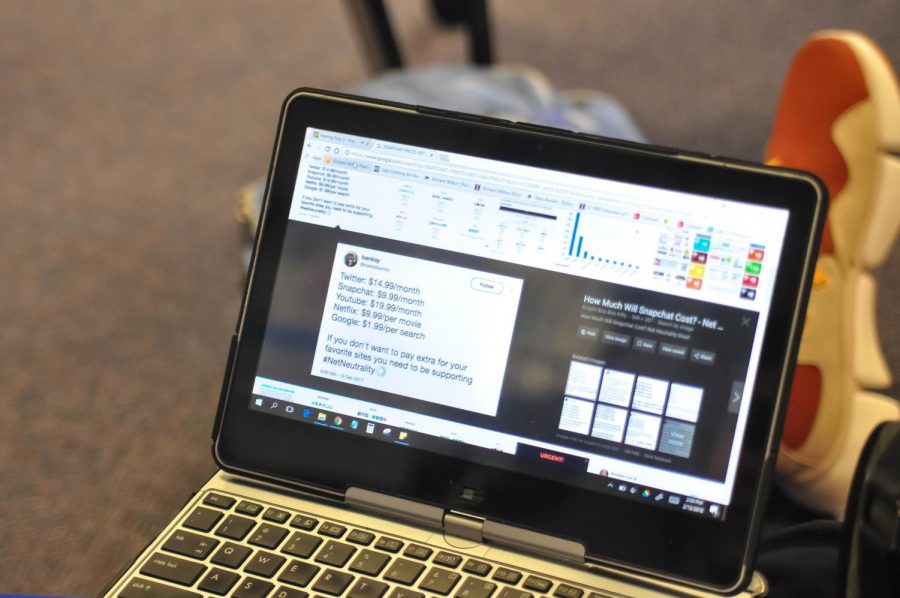Net Neutrality Eradicated: What That Means For Us
This post on Twitter is an example for what the internet would look like after the repeal of Net Neutrality if there was no competition between internet service providers to keep the prices stable.
February 15, 2018
Net neutrality is the concept that every internet service provider should treat every piece of data as equal on the internet. On Dec. 14, 2017, the Federal Communications Commission (FCC) voted to pass Chairman Ajit Pai’s plan to dismantle the Net Neutrality rules. Internet Service Providers (ISPs) will be able to slow or block any content they choose.
“So let’s be absolutely clear. Following [the Dec. 14] vote, Americans will still be able to access the websites they want to visit,” Pai said. “They will still be able to enjoy the services they want to enjoy. There will still be cops on the beat guarding a free and open Internet. This is the way things were prior to 2015, and this is the way they will be once again.”
The possibilities of Pai’s plan being repelled is unlikely. The Congressional Review Act gives Congress 60 days to decide whether it should be revoked, but the Republican party has the majority in the house. There is still the possibility of Congress delaying the vote by requesting more time to conduct research.
“This action reinstates the light-touch regulatory structure established under the Clinton Administration that protects consumers, closes the digital divide and brings next generation networks and services to all Americans,” United States senator John Cornyn said. “A return to the pre-2015 regulatory framework restores the Federal Trade Commission’s (FTC) jurisdiction to protect consumers and companies should Internet Service Providers engage in anticompetitive, unfair or deceptive acts, which is the FTC’s principal mission and purpose.”
There will not be an astonishing increase in price of internet services as there is still competition to keep the rates low.
“We shouldn’t expect anything major from the repeal,” Thomas Viehoefer said. “This has been overblown. As long as there is competition, prices won’t skyrocket because there is always an alternative. I always say the more competition, the better.”
Net Neutrality means we should not expect to be paying per Netflix episode watched but instead an overall cost from of ISPs if they choose to raise the rates. Users would end up seeing this increase on internet bills.
“Not only was there no problem, but this ‘solution’ hasn’t worked,” Pai said. “The main complaint consumers have about the internet is not and has never been that their internet service provider is blocking access to content. It’s that they don’t have access at all or enough competition.”
By having competition, consumers follow the trends to see which competitor has the lower price. Some people used to have NetZero as an internet provider, but now that seems unheard of.
“Google will be surpassed,” Thomas Viehoefer said. “Everyone once used Yahoo to search everything, but now everyone uses Google. Sony used to be the biggest technology producer with the [playstation, walkman and blu-ray player], but Sony went bankrupt recently.”
The internet has not varied much from 1990 to 2015 before Net Neutrality was in place. During Net Neutrality, ISPs were held to different standards and regulations, causing them to raise their cost overall and decreasing the amount of ISPs that could pay and adhere to the new regulations.
“These rules have also impeded innovation,” Pai said. “One major company, for instance, reported that it put on hold a project to build out its out-of-home Wi-Fi network due to uncertainty about the FCC’s regulatory stance. And a coalition of 19 municipal Internet service providers—that is, city-owned nonprofits—have told the FCC that they “often delay or hold off from rolling out a new feature or service because [they] cannot afford to deal with a potential complaint and enforcement action.”
Now AT&T has a Sponsored Data service which enables companies to sponsor the data usage for specific content. With Sponsored Data, whatever the customer uses from that promotion will not affect their monthly data allowance. Expect to see an increase in promotions, such as T-Mobil’s Netflix free of data service, which allows Netflix to “not consume data” on your bill. This is the ISPs way of picking “winners” and “choosers.”
“Simply put, by returning to the light-touch Title I framework, we are helping consumers and promoting competition,” technology analyst Benjamin Thompson said. “This means there will be more competition among broadband providers. It also means more ways that startups and tech giants alike can deliver applications and content to more users. In short, it’s a freer and more open Internet.”








